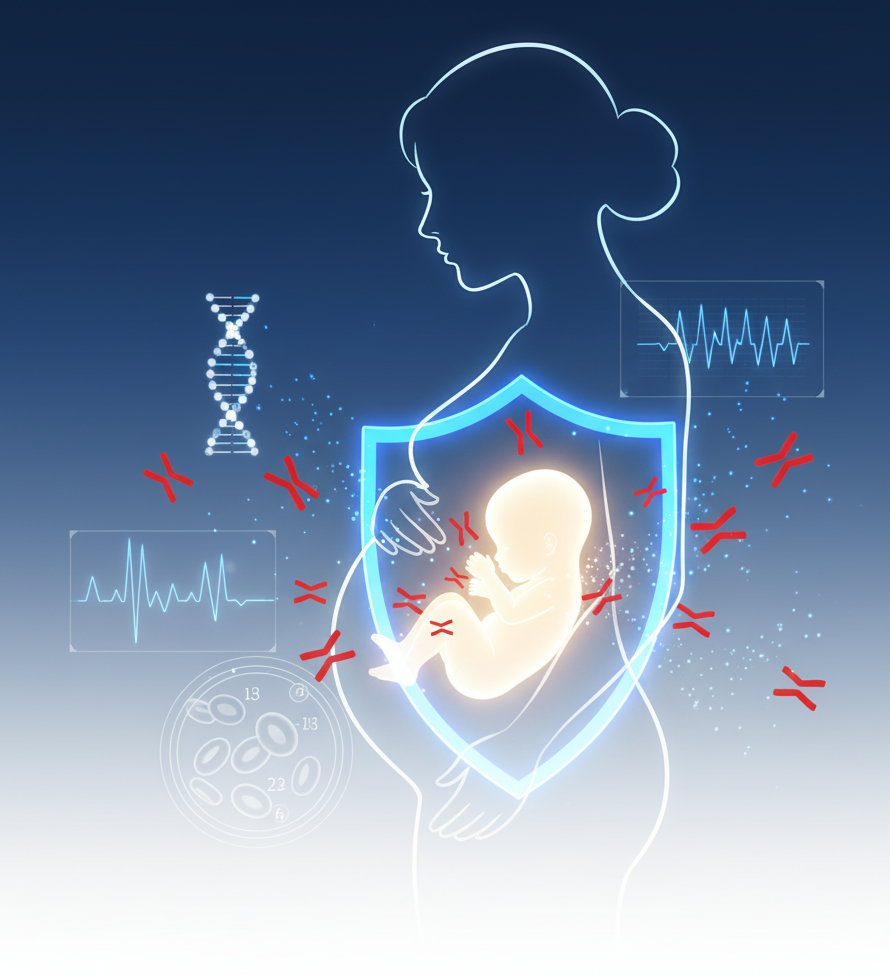
Introduction
Rh-negative pregnant women represent a unique obstetric subgroup at risk of alloimmunization—a condition where maternal antibodies develop against fetal red blood cells, potentially causing hemolytic disease of the fetus and newborn (HDFN). While administration of anti-D immunoglobulin has significantly reduced anti-D alloimmunization, the presence of unexpected non-D red cell antibodies requires vigilant screening and management. This comprehensive article explores national and international guidelines, latest research, and clinical implications surrounding screening for unexpected antibodies in Rh-negative pregnancy, aiming to inform clinicians and pregnant women alike.
The Clinical Significance of Unexpected Antibodies
Unexpected red cell antibodies, different from anti-D, include anti-Kell, anti-E, anti-c, and others. These antibodies can provoke immune-mediated fetal anemia, leading to a spectrum of adverse outcomes like hydrops fetalis or stillbirth independent of RhD status . Although less frequent than anti-D, their clinical impact is profound.
National Guidelines (Sri Lanka) and International Recommendations
- Sri Lankan Guidelines: The Ministry of Health Sri Lanka emphasizes universal antenatal blood grouping and antibody screening at booking and repeated at 28 weeks gestation for all pregnant women . These guidelines align with the global push for early detection and management of clinically significant antibodies.
- International Standards:
- The Royal College of Obstetricians and Gynaecologists (RCOG) Green-top Guideline No. 65 recommends antibody screening alongside RhD typing at the first antenatal visit and repeat screening at 28 and 34 weeks .
- The American College of Obstetricians and Gynecologists (ACOG) endorses similar protocols to detect any sensitization early .
- WHO’s 2021 consolidated guide on prevention of HDFN underscores the necessity for antibody identification and monitoring in all pregnancies .
These guidelines stress the importance of consistent, timely screening integrated into routine antenatal care.
Advances in Antibody Detection and Fetal Monitoring
Modern immunohematology techniques enable highly sensitive antibody screening, ensuring early detection even at low titers. Non-invasive fetal genotyping using cell-free fetal DNA (cffDNA) can determine fetal antigen status (e.g., RhD, Kell), tailoring antenatal management and optimizing interventions .
For sensitized pregnancies, serial antibody titration combined with sonographic monitoring (middle cerebral artery Doppler velocimetry) assesses fetal anemia non-invasively, guiding intrauterine transfusion decisions .
Management Strategies
- Prophylaxis: Administration of anti-D immunoglobulin remains the cornerstone to prevent anti-D alloimmunization in Rh-negative women following sensitizing events . However, anti-D does not prevent alloimmunization to other red cell antigens.
- Monitoring Sensitized Pregnancies: Pregnancies complicated by non-D antibodies require individualized surveillance protocols, including antibody titration and fetal well-being assessment to mitigate morbidity .
- Therapeutic Advances: Advances in fetal therapy, including intrauterine transfusion and early delivery in severe anemia, have improved neonatal survival dramatically .
- Public Health Perspective: Early antenatal registration, awareness campaigns, and adequate laboratory infrastructure are critical in low-resource settings like Sri Lanka to ensure guideline adherence and reduce HDFN incidence .
Latest Research and Findings
- A 2025 multicenter cohort study found that integration of cffDNA fetal genotyping reduced unnecessary anti-D immunoglobulin administration and enhanced targeted interventions, improving cost efficiency and patient comfort .
- Meta-analyses confirm that middle cerebral artery Doppler ultrasound strongly predicts fetal anemia progression, reducing invasive procedures .
- Emerging research identifies novel non-Rh antibodies with clinical significance, prompting calls for expanded antibody screening panels .
Educational Implications for Healthcare Providers and Patients
- Providers must maintain high index of suspicion for non-D alloimmunization and educate patients regarding the importance of serial antibody screening.
- Pregnant women, especially Rh-negative, should be counseled on the significance of early and repeated antenatal visits, screening compliance, and the benefits of advanced fetal monitoring where available.
Conclusion
Screening for unexpected antibodies in Rh-negative pregnant mothers is a vital, evidence-based practice endorsed by national and international guidelines. Advances in diagnostics and fetal monitoring combined with prophylactic strategies have substantially reduced HDFN incidence. In Sri Lanka and globally, concerted efforts toward universal screening, education, and optimized care pathways remain imperative to preserve maternal and fetal health.
References
- Moise KJ Jr. Management of rhesus alloimmunization in pregnancy. Obstet Gynecol. 2008;112(1):164-76.
- Daniels G. Human Blood Groups. 3rd ed. Wiley-Blackwell; 2013.
- Ministry of Health Sri Lanka. National Maternity Care Guidelines, 2023.
- Royal College of Obstetricians & Gynaecologists. The Management of Women with Red Cell Antibodies during Pregnancy. Green-top Guideline No. 65. 2014.
- American College of Obstetricians and Gynecologists. Practice Bulletin No. 181: Prevention of Hemolytic Disease of the Fetus and Newborn. Obstet Gynecol. 2017;130(3):e99-e109.
- World Health Organization. Screening and management of syphilis in pregnancy: Manual for laboratory and health care providers. 2021.
- Chitty LS, et al. Non-invasive prenatal diagnosis of fetal blood group status: applications and implications. Prenat Diagn. 2011;31(10):974-978.
- Grootegoed JA, et al. Cell-free fetal DNA testing in haemolytic disease of the fetus and newborn. Best Pract Res Clin Obstet Gynaecol. 2020;66:73-86.
- Mari G, et al. Doppler ultrasonography of the fetal middle cerebral artery: a new approach to the diagnosis of fetal anemia. Am J Obstet Gynecol. 2000;182(3):635-41.
- Bowman JM. Guidelines for anti-D immunoglobulin prophylaxis. Curr Opin Obstet Gynecol. 2015;27(6):455-460.
- Perera A, et al. National initiatives to prevent hemolytic disease of the fetus and newborn in Sri Lanka. Ceylon Med J. 2019;64(2):64-68.
- Sensabaugh GF, et al. Emerging red cell antibodies and their clinical significance. Transfus Med Rev. 2023;37(4):219-231.
No responses yet